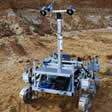The International Standard Organisation, defines a robot as an automatically controlled reprogrammable, multipurpose manifestative machine, with or without locomotion, for use in industrial automation applications. Robotics is all about designing robots, maintaining them, developing new applications and conducting research.
Robots are built to work repeatedly and accurately even in hazardous environments. They are programmed in a way that enables them to operate automatically. That's why a robot is called a re-programmable machine.
In India, studies related to robot techology and its implications are conducted by the Department of Science and Technology(DST) and Department of Scientific and Industrial Research. The research and development thrust is carried out by DST, Department of Electronics and Department of Ocean Development. IITs, too, have taken the lead in designing programmes in robotics.
Areas
Of Specialisation:
In robotics, there are different areas of specialisation. For
examples, a student who specialises in designing and control,
in robotics is close to mechanical engineering. If you want to
specialise in control and hardware design of robots, a B.Tech.
degree in electrical or electronics engineering holds the key.
A computer design programmer can look at hardware design in
robotics. The control part of the robot is all about certain
aspects of electrical engineering.
SCOPE:
A specialisation in robotics engineering may lead to potential
career opportunities in manufacturing, research and
engineering, agriculture, mining, nuclear, power-plant
maintenances and a variety of other areas. Besides, there is
great scope for qualified experts and researchers to associate
themselves with different segments of R & D in robotics.
As the recent
global career trend in robotics suggests, fields so diverse as
surgery, modern warfare and nanotechnology have registered a
remarkable increase recently in their demand for technical
experts and researches in robotics.
?
One of the
great ways to learn about robotics is to take part in robotics
competitions organised by IITs every year. Students from
various engineering colleges and high schools can take part in
this technical festival. Surveys conducted by the government
and private agencies reveal that the robots enhance the job
quality, productivity, product quality, profiatbility for
those who work in hazardous environments. Japan has the
largest number of robots and only 3 percent of the workforce
is unemployed there. The use of robots creates jobs and people
who are working manually can be rehabilitated in different
areas through training. Even, robots require maintenance,
programming and design change. So, if you rehabilitate the
displaced workers and train them in handling different aspects
of robots, it will lead to increased productivity.
Institutes:
?
Departments of mechanical
engineering, electrical engineering and computer and computer
science at IIT. Bombay, Delhi, Kanpur, Kharagpur, Madras and
IISc.
Computer Science with Specialisation in Artificial
Intelligence.
All the seven IITs in Delhi, Kanpur, Mumbai, Chennai,
Kharagpur, Guwahati and Roorkee.
The Centre for Robotics and Mechatronics at IIT Kanpur run
Master's programme in Robotics. A programme in robotics can be
pursued from several departments of the institute such as the
departments of computer science and engineering, mechanical
and electrical engineering.
National Institutes of Technology, the University of Hyderabad. M.Tech in Artificial Intelligence and Robotics.
Jadavpur University, Kolkata - ME Robotics.
Birla Institute of Technology and Science, Pilani-M E Computer Science(Robotics as a special subject)
Sri Sathya Sai Institute of Higher Learning, Prasanthinilayam(Tamil Nadu)-M.Tech.
PSG College of Technology, Coimbatore(Tamil Nadu) Mechanical(Robotics as an elective subject)
?

